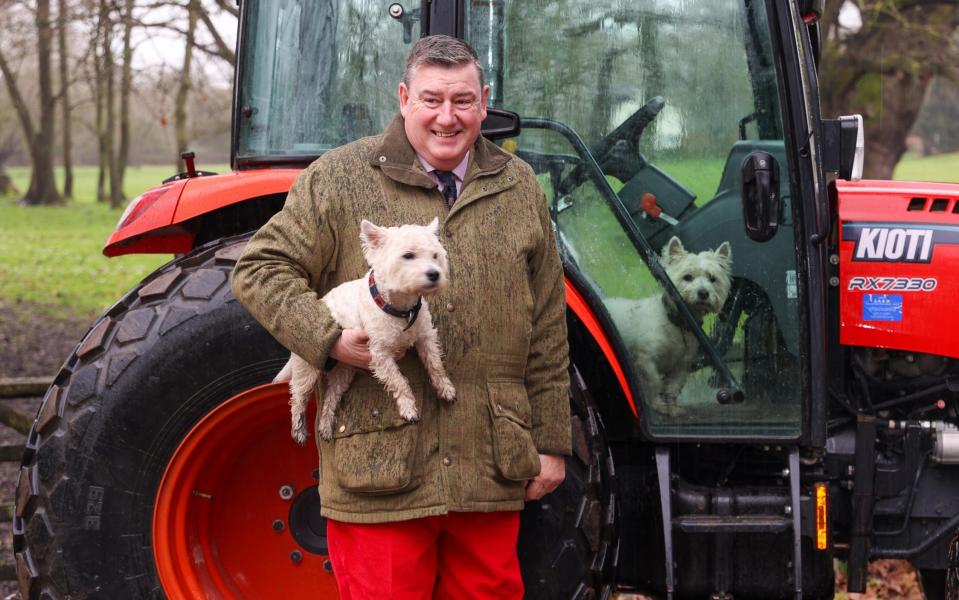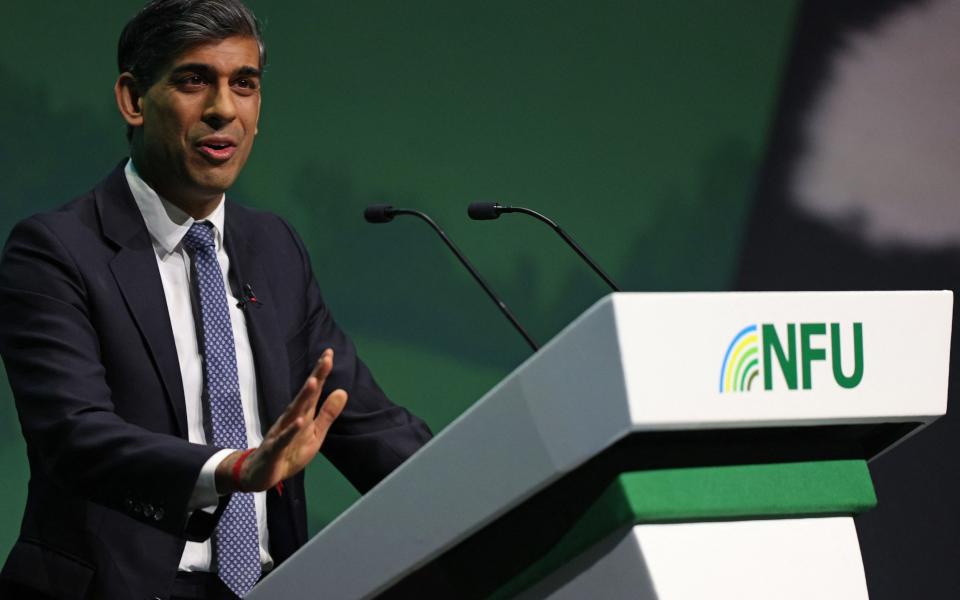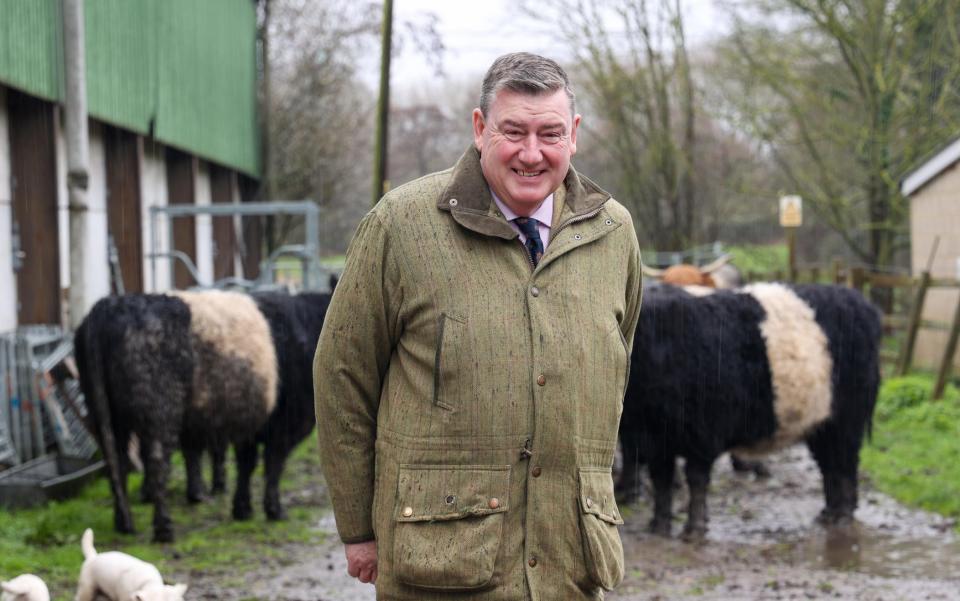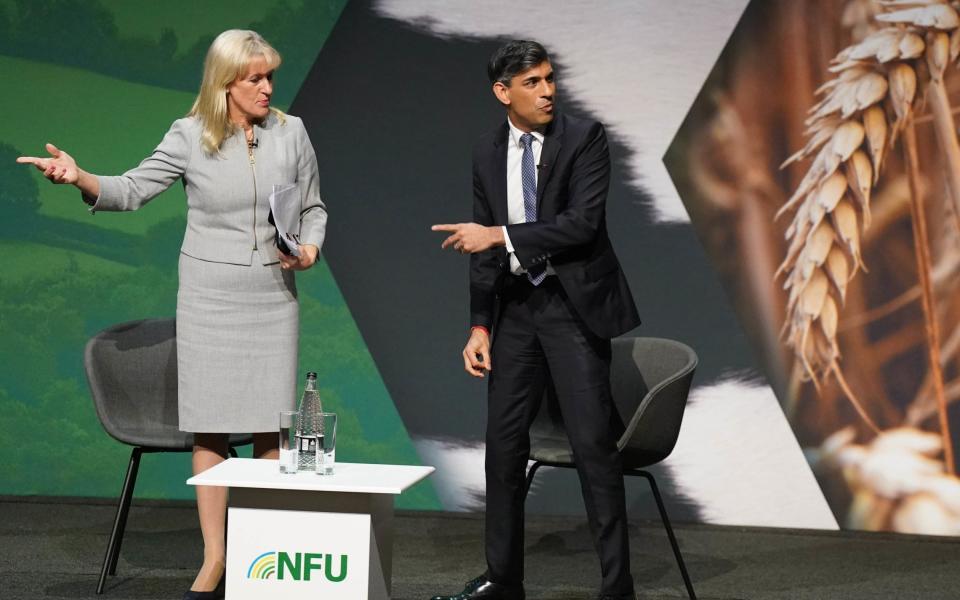How the Tories lost the countryside

- Oops!Something went wrong.Please try again later.
Colin Rayner, an arable farmer in Berkshire, describes himself as a dyed-in-the-wool conservative.
He is a lifelong Tory voter, a member of the party since the 1980s, and the president of his local Conservative association. But given what he sees as a litany of failures from the Conservative government to support farmers, Rayner is seeing red.
He fears farmers will abandon the Tories in huge numbers at the next general election and that, under a Labour government, rural communities could end up with an even worse deal.
“Farmers think that the Conservative party has abandoned them, when they have given them loyal support for many many years,” he says.
Rayner’s family have been farming the same land in Berkshire since 1551, and, along with his cousin, he currently farms just under 2,000 acres, growing wheat, barley, maize and oilseed rape. They keep a small herd of Highland cattle and Belted Galloway to supplement their income. His three daughters – triplets aged 26 – are primed to take over.
Now he fears he won’t have a viable farm for them to inherit. It has become harder and harder to make a living, thanks to rising input costs, low supermarket prices and farming policy that, as he sees it, disincentivises farmers from doing what they have done for centuries: put food on the table.

Under the new Sustainable Farming Incentive scheme, introduced in 2022, “the Government wants us to plant wildflowers instead of grow food,” he says. “Our hands are tied… we are now producing food below the cost of production.”
He estimates that last year he lost £300 on every acre of wheat he farms. “We need the politicians of all parties to understand that we need food from the UK,” he says. “I’m 66 now, I should be retired. But I’m going to have to work for another 12 years whether I like it or not, because we’re losing money farming so I’m not saving any for retirement.”
At last week’s National Farmers Union (NFU) conference, Rishi Sunak told farmers, “I have your back” and reminisced about the time he milked a cow. Rayner, who was in the audience, says the atmosphere was “mildly hostile”, as many farmers now feel this is nothing more than empty rhetoric.

The trade deals Boris Johnson struck with Australia and New Zealand when he was still prime minister are another point of contention. They came into force in May 2023 and eliminated tariffs on agricultural products, opening the floodgates to imports from Australia and New Zealand.
British beef, lamb and dairy farmers have higher costs of production than their counterparts on the other side of the world and many feel they simply cannot compete.
“We seem to have a government that blames the farmers for everything,” says Rayner. “They just say, ‘We love farmers’, but the trade deals [such as those for cheap lamb from New Zealand] have upset farmers a great deal.” Upset them so much, in fact, that it might change how they vote.
With a general election on the horizon, all signs point to the “true blue” rural heartlands turning red, or green, or yellow. Polling conducted by the Country Land and Business Association (CLA) forecast that the Conservatives would lose 53 of the 96 rural seats they currently hold in the next election (including those of Jacob Rees-Mogg, Jeremy Hunt and Thérèse Coffey) and that Labour would win 51, up from 3 in 2019. Politico’s London Playbook called it the “2024 election equivalent of the red wall moment”.
“I’m not sure about a red wall. Can’t it be a green hedge?” asks Victoria Vyvyan, the president of the CLA. The results of the poll come as no surprise to Vyvyan. That being said, she says farmers or those in rural communities are unlikely to be defecting to the Green Party – her view is that the Green Party takes “an urban view that’s very critical of the [environmental] work that we do”.
All the issues facing farming essentially boil down to the same age-old problem: rural communities feel ignored by Westminster. “A year or so ago I was speaking at a small farming evening and, at the end, the first hand that went up said, ‘Why does nobody respect our community? Why is our community deemed so unimportant by the Government?’ I think what we feel is that we’re politically invisible,” says Vyvyan.
“Maybe there’s been a history in these large political parties of thinking they have our vote for life,” she says, “but they don’t – we lend them a vote for five years, and then we expect them to come and ask us again.”

This sea-change is already evident in a series of by-election swings fuelled by the farming vote. In June 2022, the Tories lost the Tiverton and Honiton seat to the Lib Dems. In North Shropshire, they went on to lose a seat they had held for 115 years to Lib Dem Helen Morgan, who overturned a Conservative majority of over 23,000. In July last year, there was another Lib Dem victory over the Tories in Somerton and Frome.
Recent data commissioned by the NFU from Deltapoll was equally damning about the Conservative chances in the next election. It showed that Conservative support in heartland farming constituencies could plummet from 58 per cent at the 2019 election to 32 per cent this year.
It also projected that Labour would gain a narrow lead with 36 per cent of the rural vote, up from 20 per cent in 2019, and the Lib Dems would hold steady at around 14 per cent. There was a surge in voting intention for “other” parties, from 6 per cent in 2019 to 18 per cent this year, which Deltapoll says is driven by support for Reform. And 59 per cent of adults said that the current Government has not done enough to support British farmers.
In her last address as NFU President, Minette Batters pointed out that in Britain, as a landowner, you can receive between £800 and £1100 per acre if you put up a solar farm (index-linked for a minimum of 20 years).
Imagine if the same applied to growing veg, she said. “Why do other elements of our critical national infrastructure receive guaranteed financial support from the taxpayer when food production does not?”

Despite the fact that swathes of the countryside could turn red, Vyvyan, who lives in the Conservative constituency of St Ives in Cornwall, is not convinced that Labour has a significantly better offer for those who live rurally. “It’s a race to the bottom, isn’t it?” she says.
In CLA polling, more voters – 28 per cent – said that Labour understood and respected rural communities and their way of life than the Conservatives (25 per cent). But “neither of them should be patting themselves on the back,” she says. Rural communities are “incredibly innovative, entrepreneurial and hard-working”, with untapped potential – if only politicians were willing to listen.
Some farmers, like Tom Bramall, 60, are undecided “floating voters”. Bramall is a third-generation dairy farmer in Cheshire who works with his wife, Catherine.
“I was very against Brexit, which is unusual for a farmer – most of them voted for it and probably regret it now,” he says. Building a new agricultural policy framework from scratch is a “difficult challenge” which he feels the Government has done a reasonable job of solving, although “there’s a danger they’ve gone too far with some of the greening policies and it might actually be threatening food production”.
He has historically voted Conservative, and would now reconsider. “I want to say that we could do with change, but I’m struggling to see the Labour Party come up with positive policies to combat climate change and be pro-business at the same time,” he says.
Everyone I speak to cites Wales as a salutary tale for how Labour policies can run farming into the ground. Recent CLA polling found that just 3 per cent of Welsh farmers trust the Labour-run Welsh government.
Vyvyan says they have “every right to be fed up”. In England “we are three years into a [post-Brexit] transition – in Wales they haven’t even started, and they’ve reduced the budget. So farmers feel hung out to dry.”
One idea that has been put forward is that farmers should have to plant 10 per cent of their land with trees. This month, farmers have resorted to French-style slow tractor protests against the Government’s proposals.
A Welsh Government spokesman said: “Farming is very important to Wales and our economy and we want a successful future for Welsh farming. We are committed to continuing to work with farmers to develop the Sustainable Farming Scheme. No decisions will be taken about any element of the proposal until we have conducted a full analysis of the consultation responses.”
But in parts of England it is a similar story. Farmers in Kent have similarly staged a tractor blockade against low supermarket prices and cheap imports. Perhaps, when the election comes round, they will take their protest to the ballot box.
A Government spokesman said: “At this year’s NFU Annual Conference the Prime Minister committed to supporting farmers and strengthening our food security after destabilising events like Russia’s invasion of Ukraine and soaring global prices. This includes setting out the biggest ever package of grants, expected to total £427 million, with funding for future focused farming technology and productivity schemes.
“Our voluntary schemes in England put sustainable, profitable and diverse food production at their core, while supporting farmers to protect the environment – with nearly half of all farmers already signed up. We continue to invest in farming through the £2.4 billion annual farming budget and look at ways to improve fairness in the supply chain, prioritise new export opportunities, protect UK food standards and remove market access barriers.”

